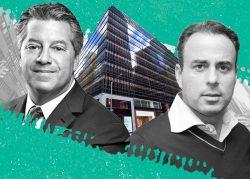A decade-long soap opera playing out on the Manhattan skyline wrapped up this week.
Marc Holliday’s SL Green and its partners took control of the ground below the 625 Madison Avenue office tower from billionaire investor Ben Ashkenazy. The war over the site a block from Central Park pitted two of the industry’s shrewdest players against each other — and illustrated just how hard-knuckled New York real estate can be.
The Real Deal put together a timeline to show how it all went down.
1956: A 17-story building at 635 Madison, between East 58th and East 59th streets, is developed as Nabisco’s headquarters.
1986: Stephen Ross’ Related Companies buys the building, overhauls the dated office and brings in Ron Perelman’s cosmetics giant Revlon as the anchor tenant.
2004: SL Green, led by Marc Holliday, buys the leasehold for the office building, which had been separated from the ground underneath it.
2013: Ashkenazy and his partner Michael Alpert beat out institutional investors and deep-pocketed buyers to purchase the ground under 625 Madison for $400 million.
At that point, the building was mostly leased to Polo Ralph Lauren for its offices. SL Green was paying just $4.6 million in annual rent on the ground lease, with a rent reset coming in 2022.
The $400 million that Ashkenazy paid meant he anticipated a hefty rent hike in nine years’ time.
2016: Ashkenazy’s partner, Alpert, starts playing hardball. With luxury supertall condos rising on Billionaires’ Row, he thinks 625 Madison would be worth at least $1.4 billion as a residential development site. That would jack up the rent to $80 million a year.
“The land under 625 Madison Ave. is absolutely one of the best development sites in Manhattan,” Alpert tells Crain’s. “In addition, the ground lease has a very clear valuation clause.”
2018: When Ashkenazy bought his fee position, he had financed it with a $195 million mezzanine loan from the UK-based hedge fund Children’s Investment Fund, which has bankrolled big projects such as HFZ Capital’s One High Line and Related’s 35 Hudson Yards. The loan required Ashkenazy to repay $40 million of the debt by November 2018, but when the deadline came he had only paid down $30 million.
As Ashkenazy tussles with the hedge fund in court, SL Green buys a piece of the mezzanine debt — a savvy move that gave Holliday serious leverage with his landlord.
2021: Ashkenazy’s attorneys lay their cards on the table, arguing that SL Green is playing hardball over the paydown to gain an upper hand in rent negotiations.
“It should be reasonably apparent that something else is driving [this] behavior,” Ashkenazy’s attorneys wrote in court filings.
2023: Ashkenazy gets his rent hike, as an arbitrator sets the annual amount at $20.25 million.
The higher ground-lease rent SL Green now had to pay rendered the firm’s $230 million investment in the building worthless. But SL Green held a trump card. The REIT and its partners, as holders of the mezzanine debt on Ashkenazy’s stake in the parcel, moved to foreclose on it.
The lenders took over Wednesday at a UCC auction and now control the site.
Read more



